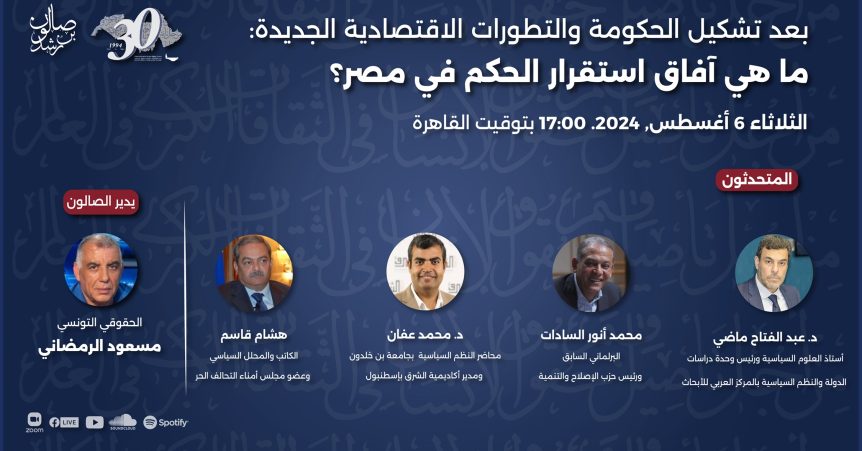On Tuesday, 6 August 2024, the Cairo Institute for Human Rights Studies (CIHRS) held a seminar as part of the monthly activities of Salon Ibn Rushd, titled ‘What are the prospects for stability of the government in Egypt?’ . The seminar occurred amid recent economic turmoil and political developments, the formation of the new government, and continued efforts to suppress political opposition. Meanwhile, the security sector is preparing a partisan backer to support the current authority before the parliamentary elections scheduled for next year. The salon hosted Dr. Mohammad Affan, lecturer in political science at Ibn Khaldun University and director of the Al Sharq Academia in Istanbul; Dr. Abdelfattah Mady, professor of political science, director of the State Studies Unit at the Arab Center for Research and Policy Studies and editor-in-chief of its journal ‘Hikama’,” former parliamentarian Mohamed Anwar el-Sadat, head of the Reform and Development Party, and writer and political analyst Hisham Kassem, member of the Board of Trustees of the Free Alliance. The salon was moderated by Tunisian human rights defender Messaoud Romdhani.
The speakers began the discussion by underscoring the deterioration of the economic situation in Egypt, ruling out that the new government would have any clear impact on the worsening economic crisis. Hisham Kassem considered that the change of government is merely routine procedure related to the presidential elections; it grants the ruling authority opportunity to remove some unpopular ministers to Egyptians while conveying that there is change in Egypt. Dr. Mohammad Affan considered that changing governments is redundant, as long as the decision-making mechanism in Egypt remains unchanged. Affan noted that the current regime is only seeking to buy time, as there is neither the desire nor the ability to truly engage with the crises. Affan added that changing ministers of the government’s economic group does not entail genuine reform in economic trends and policies, but rather serves more as a short-term and partial solution.
Dr. Abdelfattah Mady attributed the crisis largely to the spread of the military establishment into the economy, which is difficult for any government to address without a clear political decision. Mady added that the current regime is based on and derives its survival from ‘satisfying’ the military establishment by ensuring its involvement in the economy and its attainment of economic privileges. Mady described the situation as ‘employing the military in the current ruler’s personal survival project’. Affan demonstrated this with a series of pledges that have been repeated for years regarding the reduction and rationalization of the army’s economic and political role. Affan added that these pledges ‘evaporate’ from time to time amid various excuses and new slogans, starting with ‘the army is the locomotive of development’, allowing the military establishment the authority to infiltrate economic and development projects, which pass through the army as a ‘political safety valve’ and facilitates military control of political life. Affan further said that in a verbal paradox, the 2019 constitutional amendment stipulated the army’s responsibility of guaranteeing the civil state, granting it the constitutional justification for political and economic intervention. Hisham Kassem added another aspect to the crisis, which is that the army does not engage in ‘productive economy’, but rather focuses on ‘profitable economy’. Kassem continued that the army’s investments are focused on the hotel, cafeteria and restaurant sector. Kassem explained that while companies officially owned by the army are very limited, the crisis remains in companies and investments that are affiliated with the army, but on paper owned by individuals.
Mady did not exempt political opposition from the obligation to address the deteriorating situation, indicating that the current regime will not make free concessions. Mady added that as long as the opposition remains divided, this authority will remain the sole authority controlling the fate of the people. Kasssem supported Mady’s claim and described the current opposition as ‘lacking influence, programs and presence in the street’. However, he affirmed the current regime’s brutality against any attempts, even weak ones, to form an opposition front. Kassem cited the most recent incident of the kidnapping and arrest of politician Hussein Abdel Hadi, on the same baseless charges frequently used by the prosecution to throw any opponent in prison, to the point that it has become futile to even respond to such charges.
Anwar el-Sadat said that this economic and political crisis undoubtedly creates a severe state of popular anger and resentment. El-Sadat described it as the result of a series of living pressures, rising prices, limited salaries, fuel price hikes, and the electricity crisis. He pointed out the need to move towards structural economic reforms to encourage investment and limit popular anger. El-Sadat added that these reforms further include legislative reform, an independent judiciary, fair competition without monopoly, a re-evaluation of priorities, especially for productive projects with returns and revenues, and a government that begins to rationalize consumption itself and avoid extravagances that provoke citizens and distract them from rationalizing consumption.
Mohammad Affan warned that continuing to pressure people without any improvement at any level will push people to an uncalculated explosion. Affan pointed out the danger of constantly waving the stability and security file to address cases of resentment and anger, warning that the current regime ‘takes Egypt and its stability hostage in order to go to the furthest extent in its political and economic agenda, this is what is called blackmailing with security’.
Watch the full webinar:
Share this Post

